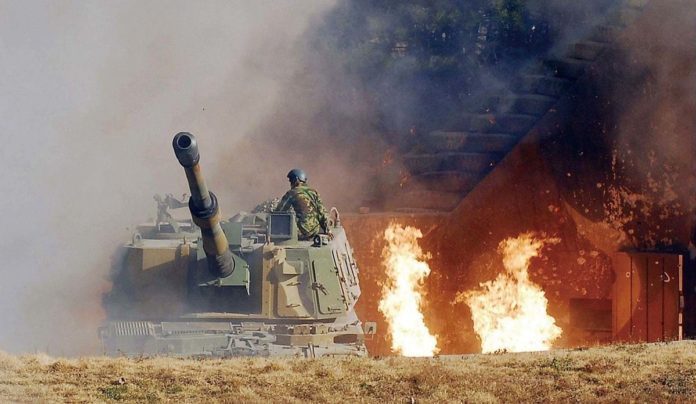This article was originally published on 1945.
The inauguration of the new administration of President Yoon Suk-yeol of the conservative People Power Party will lead to a shared view on North Korea that was absent under Yoon’s nationalist-liberal predecessor Moon Jae-in. In a rare policy triangulation, South Korea, the United States, and Japan share the same view that North Korea is first and foremost a major threat to be deterred, not a misunderstood neighbor to be consoled.
While this alignment offers many grand strategic options to improve our current relationship, there is a far less obvious proposal that I assess will have strategic implications and improve our mutual security over the long-term. The United Nations Command (UNC) should appoint a South Korean deputy commander.
I was Special Advisor for North Korea and Senior Advisor for Korea Policy in the U.S. Office of the Secretary of Defense from 2017 until January 2021. Right after I left office, I wrote an article for The Diplomat on how the United Nations Command in South Korea had become a constant source of friction between the United States and our Korean allies. My proposal is one step to address that tension and hopefully prevent its recurrence when administrations change in South Korea.
As background, the United Nations Command is one of the three major U.S. military commands on the Korean Peninsula, along with the binational U.S.-Korea Combined Forces Command (CFC) and U.S. Forces Korea (USFK). The same U.S. general officer commands all three but under different authorities. Among them are setting rules of engagement during Armistice conditions, control over certain strategic waterways like the Han River Estuary, approval of border crossings, and enforcement of the south side of the Demilitarized Zone separating the two Koreas.
Contrary to what its name suggests, UNC is not a UN peacekeeping operation, and its only ties to the United Nations organization are the UN Security Council Resolutions that authorized it, the use of UN flag, and its requirement to provide a regular report to the UN on its activities. The UNC signed the Armistice of 1953 with North Korea on behalf of the defenders, while Seoul never has.
UNC has a proud history as the U.S.-led command of the free nations that answered the call to defend South Korea from the North Korean invasion, known as the Sending States. Foreign officers are a regular site at UNC Headquarters and the DMZ. Over the last decade, its deputy commander has been from Canada, Australia, the United Kingdom, etc. If conflict again breaks out, many of the original sixteen Sending States (and perhaps new ones) have committed to returning to defend the ROK. If that happens, UNC will receive and allocate those forces to the warfighting elements.
Because South Korea did not sign the Armistice Agreement, it is not technically a member of UNC. I have heard Seoul call itself “a state in association” or a “state at issue” with UNC. Despite this, the ROK military is deeply involved in UNC activities. Hundreds of ROK military personnel, officers and enlisted alike, serve and have served at UNC as part of their military service. Half of the border guards you see at the Military Demarcation Line facing down their North Korea counterparts will be South Korean military.
As I wrote in my previous article for The Diplomat, I assess South Korea’s mistrust of UNC stems from three specific arguments: that it violates South Korea’s sovereignty, that it is designed as an alternative warfighting command to short-circuit the CFC construct, and that it is an embarrassing relic of the country’s past.
I addressed these allegations in my previous article, so I will not readdress them here. However, I cannot discount that many Koreans believe these arguments, and they have deeply infiltrated South Korea’s public discourse on the matter. My proposal can address them.
An ROK Deputy Commander who is daily involved in the operations, maintenance, and management of UNC is a powerful signal of our respect for Korean sovereignty. Similarly, if and when UNC is required to accept and allocate forces, a ROK deputy commander would be involved in their assignments. An ROK deputy commander would also be the domestic face of UNC for the Korean people and its elected leaders. As such, he would be best positioned to explain that UNC is a critical element of Korea’s security now, and not some relic of the Cold War.
Let us not overlook the practical elements, too. The South Korean military is widely trusted and respected, so a Korean UNC deputy commander would help insulate UNC from attacks about its roles, missions, and capabilities.
A general officer from one of the Sending States should remain as a deputy commander, but a second should be created. For example, one general officer could be a Deputy Commander for Plans and Policies, while the other could be Deputy Commander for Operations and Training.
Alliance strain is a real thing and will occur no matter how strong and institutionalized our relationship is. But I assess the Korean polity’s fears of UNC are unique and particularly dangerous to the operations and maintenance of our critical alliance. That is why I propose that UNC needs to take the step now of adding a Korean deputy commander, while our governments are in strategic alignment.
South Korea is a modern, powerful, proud country. So even though I believe UNC has an invaluable role to play in Korean affairs, I also believe the United States must demonstrate unmistakable respect of Korea’s sovereignty and Seoul’s desire to more actively guide its destiny.


